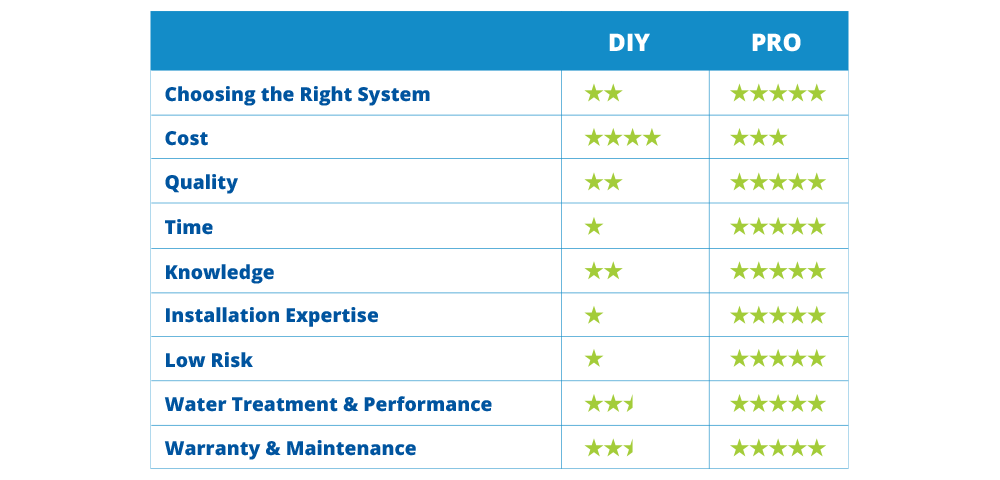
Should I Hire a Professional or DIY My Home Water Filtration?
When it comes to improving the quality of your water, many see products sold in big box stores and feel that they can DIY a water filtration system, installing it themselves or even coming up with their own filtration system. While at face value, this might seem like a feasible or cost-effective solution, the reality is that DIY water filtration systems may not work out as it is intended or even end up being more expensive in the long run. Read on to learn more about home water filtration systems and the pros and cons of hiring a water filtration system professional.
Types of Water Filtration Systems
Many homeowners can feel lost in the variety of water filtration systems that are available, unsure of their functionality or what they even need. Let’s break down the different types of water filtration systems before we dive into the water filtration system that’s best for your home. Some of these can be a DIY water filtration system but others do require a professional installation. The types of water filtration systems can be boiled down into three categories: primary (includes water softeners and conditioners), filtration (includes whole-home inline and backwashing), and point of use (drinking pitchers, faucet filters). If you would like to learn more, the CDC offers a breakdown of what different water treatment systems address.
What’s The Best Water Filtration System For My Home?
While even navigating the types of water filtration systems available can be challenging, choosing the system that is right for your home can be just as daunting. Selecting the wrong type of system for your home can leave you stuck with the same problems you had before you attempted to treat your water. While we recommend consulting a professional before selecting a water filtration system for your home, homeowners can assess a few things to get an idea of what system will work best by considering a handful of factors. Some of the main factors that a homeowner should consider include: water hardness, other contaminants, how much water your family uses daily, water pressure, maintenance, as well as things like space and aesthetics.
Depending on where you live in the United States, you may be facing different types of regional problems with your water. While some water filtration systems can treat more than one issue, often, homeowners would need to look to a specific system that will address their specific needs. Sales and Operation Manager at Water-Right’s Clean Water Center, Nate Fritz, said that “Water is the forgotten thing in the house until something goes wrong, and people don’t know a whole lot about how to fix it. They kind of guess and hope they get it right until they talk to a professional.”
Fritz also explained that when homeowners are considering a water filtration system, they should first test their water: “First and foremost, the most important thing to consider is the water test results. Not all systems are the same, and each treats the water differently.”
Furthermore, Fritz advised that there are some basic questions that homeowners should ask themselves to help determine what water filtration system they need for their home. Such as, “What’s in the water? How much water is being used? How fast is the water being used?” So, if you have a jetted shower or whirlpool tub, it requires a large amount of water in a short amount of time. You need a system that can handle those flow rates to treat the water. Basically, what are the needs based on the water testing, and what are the flow rates and number of gallons that need to be treated? Beyond that, what are the needs of the customer?
Just as different systems offer different solutions to water concerns, each customer has their own concerns. One homeowner might not mind a slight, harmless odor but does not want to deal with iron staining on their sinks, bathtubs, and washing machines. The specific needs of the customer are just as important to consider as the system that gets installed, either as a DIY or a professional.
Should I Hire a Professional?
Overall, there is a lot to consider when choosing a DIY water filtration system or hiring a professional to help select and install the proper water system for your home. Let’s break down the considerations that we’ve discussed in the chart below and which option provides the best results:

Choosing The Right System For Your Home
Choosing the right water filtration system is paramount. A professional will know what system is right for your water and ensure that it is installed efficiently and properly. Through Nate Fritz’s experience, he has seen a number of homeowners attempt to select the right system for their home, but it’s often not matched properly. “It’s usually choosing the wrong system for their application. Putting in a water softener thinking it’s going to handle odor, etc. The systems are just overmatched.” Each water contaminant is unique, and needs removed by a method that matches its unique properties. When you rely on a water filtration expert, they will provide a complimentary water test to access what is in your water and come with years of experience to apply the right products to the situation – saving you hours of product research!
Cost & Quality Products
Many homeowners want to remedy their water problems in the most cost-effective manner possible. Though the basic cost of a water purification system or filtration system from a big box store will be cheaper than the products sold from a reputable dealer, they are often cheaper for a reason. Often, internal parts are made with cheaper alternatives that work but that won’t last. Filtration systems sold from a dealer will contain quality materials that are intended for longevity.
One thing that homeowners might not think about when going the DIY water filtration route is the flow rates and the demand of the unit. Most big box water softeners or water filtration equipment will provide for 2-3 gallons per minute continuous flow rate. Fritz explained, “If you’re using more than that, hardness and iron will be able to pass through untreated. Professional systems you’ll get double or triple that, which means you can run more water at one time and still get treated water. That’s based on the quality of the resins, all of the engineering and mechanics behind it.” Fritz offered an example to explain the difference, “For example, a shower head is typically at a 3-gallon flow rate. If you run a load of laundry while someone is in the shower, you’re going to get hardness breaking through.” Essentially, homeowners run the risk of not having their water treated in the way that they need or want.
If you have concerns about contaminants in your water that may be harmful to your health, like lead, arsenic, or nitrates, it is important to purchase a water filtration system that is certified for those specific issues. In some cases, it is critical that a professional be the one to install a certified water filtration system that will appropriately take care of contaminants. This is especially true in some states, where the certification is required. Fritz explained, “Equipment that is certified to remedy specific contaminants is typically only available for licensed professionals. The big box store product may get rid of solids, but it doesn’t mean it will remove that contaminant.”
Time & Installation Expertise
Professionals who know what they are doing will be able to expertly install the system. Time is money, too, and should be considered when choosing to go the DIY route or to hire a professional. For the homeowner who is unfamiliar with the intricacies of installing a water filtration system, it can take much longer to install the product. Simply not knowing what tools are needed can result in extra trips to the store to acquire necessary tools, piping, tube clamps, and more which can make what was supposed to be a quick project into a multi-day event.
Similarly, a homeowner going the DIY water filtration route is likely inexperienced with potential installation hang-ups and might not know how to proceed. An experienced professional will be able to assess and correct any issues that may arise and should not end up damaging any plumbing during the installation. A homeowner could end up causing plumbing leaks without realizing it, which can cost them more in the long run in not only the water damage done in the home but hiring a professional to come out to fix a botched job often costs more than just having them come out and do the job the first time.
Water Testing
While homeowners can test their water with at-home strips, Fritz cautioned homeowners: “The big drawback with test strips is that for the most part they aren’t that accurate — there is always some variation.” Checking for the appropriate performance of the product and to ensure it is dialed in specifically to your needs is something that a professional excels at doing. “The best way is through a professional. We can run it through cycles. We are experienced with the systems and sometimes can even hear noises, which helps us diagnose the problem and fix it before it causes a bigger issue in the home.”
Maintenance & Warranties
Fritz offered that most professionals have better products and warranties that cover more than what can be found on items sold at a big box store. While warranties may vary depending on the company, Fritz explained the warranty offered on products sold by the Water-Right Group, “We have the manufacturer’s warranty on everything – parts and pieces. We do offer labor coverage for one year at our local dealership performing the installations to homeowners. Depending on what system they go with, they have the option to go on a maintenance plan where we are doing the monitoring and maintenance after installation. It’s going to last longer, be more efficient, and because we’re essentially taking care of the equipment, we change the warranty to a lifetime warranty.”
One other consideration to add is that if something goes wrong with the water filtration system after it has been installed, and a part needs to be replaced, homeowners often have a hard time finding the right part. If they are able to find it, installing it then can become another issue. This also can become a problem with voiding a product’s warranty.
Ready to Hire a Pro?
Homeowners need a water filtration system that is going to work well and solve their problems. If choosing the DIY water filtration route, they may end up with a product that simply doesn’t do that. Fritz encouraged homeowners to consider the benefits of hiring a professional: “You have someone who is going to stand by the product and get you the water quality you want and deserve. Many professionals offer value-added services like salt delivery and filter changes. Depending on the system, we can even conduct remote monitoring on systems with WiFi and adjust things as necessary.”
Certainly, there are some positive aspects to a homemade water filtration system or simply installing a big box store-bought system yourself. However, in looking at the chart, it is clear that the benefits to hiring a professional clearly outweigh any that could be achieved through DIY water filtration.
Would you like to connect with a water filtration professional in your area?

